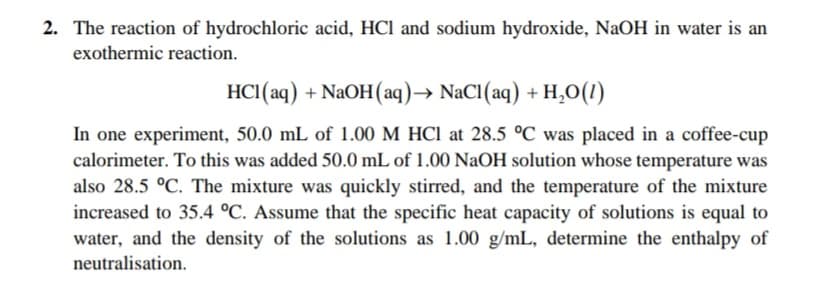2. The reaction of hydrochloric acid, HCl and sodium hydroxide, NaOH in water is an exothermic reaction. HCI(aq) + NaOH(aq)→ NaCI(aq) + H,O(!) In one experiment, 50.0 mL of 1.00 M HCl at 28.5 °C was placed in a coffee-cup calorimeter. To this was added 50.0 mL of 1.00 NaOH solution whose temperature was also 28.5 °C. The mixture was quickly stirred, and the temperature of the mixture increased to 35.4 °C. Assume that the specific heat capacity of solutions is equal to water, and the density of the solutions as 1.00 g/mL, determine the enthalpy of neutralisation.
Thermochemistry
Thermochemistry can be considered as a branch of thermodynamics that deals with the connections between warmth, work, and various types of energy, formed because of different synthetic and actual cycles. Thermochemistry describes the energy changes that occur as a result of reactions or chemical changes in a substance.
Exergonic Reaction
The term exergonic is derived from the Greek word in which ‘ergon’ means work and exergonic means ‘work outside’. Exergonic reactions releases work energy. Exergonic reactions are different from exothermic reactions, the one that releases only heat energy during the course of the reaction. So, exothermic reaction is one type of exergonic reaction. Exergonic reaction releases work energy in different forms like heat, light or sound. For example, a glow stick releases light making that an exergonic reaction and not an exothermic reaction since no heat is released. Even endothermic reactions at very high temperature are exergonic.

Trending now
This is a popular solution!
Step by step
Solved in 5 steps with 1 images









